James L. Gibson is the Sidney W. Souers Professor of Government at Washington University in St. Louis and Professor Extraordinaire in Political Science at Stellenbosch University in South Africa. He is the author or coauthor of eight books, including Citizens, Courts, and Confirmations, and is the recipient of an APSA Lifetime Achievement Award.
The University of Chicago Press, Chicago 60637
The University of Chicago Press, Ltd., London
2012 by The University of Chicago
All rights reserved. Published 2012.
Printed in the United States of America
21 20 19 18 17 16 15 14 13 12 1 2 3 4 5
ISBN-13: 978-0-226-29107-9 (cloth)
ISBN-13: 978-0-226-29108-6 (paper)
ISBN-13: 978-0-226-29110-9 (e-book)
ISBN-10: 0-226-29107-3 (cloth)
ISBN-10: 0-226-29108-1 (paper)
ISBN-10: 0-226-29110-3 (e-book)
Library of Congress Cataloging-in-Publication Data
Gibson, James L., 1951
Electing judges : the surprising effects of campaigning on judicial legitimacy / James L. Gibson.
pages. cm. (Chicago studies in American politics)
ISBN-13: 978-0-226-29107-9 (cloth: alkaline paper)
ISBN-10: 0-226-29107-3 (cloth: alkaline paper)
ISBN-13: 978-0-226-29108-6 (paperback: alkaline paper)
ISBN-10: 0-226-29108-1 (paperback: alkaline paper)
[etc.]
1. JudgesUnited StatesElection. 2. Judicial ethicsUnited States. I. Title. II. Series: Chicago studies in American politics.
KF8776.G538 2012
347.7314dc23
2012001904

This paper meets the requirements of ANSI/NISO Z39.48-1992 (Permanence of Paper).
E LECTING
JUDGES
THE SURPRISING EFFECTS OF CAMPAIGNING
ON JUDICIAL LEGITIMACY
JAMES L. GIBSON
THE UNIVERSITY OF CHICAGO PRESS
Chicago & London
CHICAGO STUDIES IN AMERICAN POLITICS
A SERIES EDITED BY BENJAMIN I. PAGE, SUSAN HERBST, LAWRENCE R. JACOBS, AND JAMES DRUCKMAN
Also in the series:
Follow the Leader? How Voters Respond to Politicians Policies and Performance
by Gabriel S. Lenz
The Submerged State: How Invisible Government Policies Undermine American Democracy
by Suzanne Mettler
Disciplining the Poor: Neoliberal Paternalism and the Persistent Power of Race
by Joe Soss, Richard C. Fording, and Sanford F. Schram
Why Parties? A Second Look
by John H. Aldrich
News That Matters: Television and American Opinion, Updated Edition
by Shanto Iyengar and Donald R. Kinder
Selling Fear: Counterterrorism, the Media, and Public Opinion
by Brigitte L. Nacos, Yaeli Bloch-Elkon, and Robert Y. Shapiro
Obamas Race: The 2008 Election and the Dream of a Post-Racial America
by Michael Tesler and David O. Sears
Filibustering: A Political History of Obstruction in the House and Senate
by Gregory Koger
In Time of War: Understanding American Public Opinion from World War II to Iraq
by Adam J. Berinisky
Us Against Them: Ethnocentric Foundations of American Opinion
by Donald R. Kinder and Cindy D. Kam
The Partisan Sort: How Liberals Became Democrats and Conservatives Became Republicans
by Matthew Levendusky
Democracy at Risk: How Terrorist Threats Affect the Public
by Jennifer L. Merolla and Elizabeth J. Zechmeister
To the love of my lifeMonica E. Kinsella
CONTENTS
PREFACE AND ACKNOWLEDGMENTS
Those who know me or who have followed my research over the years may be somewhat surprised at this foray into the world of state judicial politics: I am not generally known for working on state courts. Becoming acquainted with the literature and the players in the field has been an interesting and occasionally challenging endeavor.
My interest in the topic was piqued by the US Supreme Courts decision in Republican Party of Minnesota v. White, as will become apparent throughout this book. As in many judicial decisions, assertions and assumptions about empirical reality abound. The minority in White, for example, propounds a theory of citizen perceptions and judgments of judicial impartiality. Campaign speech can be banned because such speech teaches citizens that judges have already reached a decision on issues prior to cases coming before them on the bench, and this variety of closed-mindedness gives the impression that fair and impartial decisions cannot be rendered. Many legal controversies are (or can be) at their root empirical questions about which social scientists may well have something to say.
Consequently, I started thinking about the various issues raised by White from the perspective of hard-nosed empirical social science. At the time, I did not know a lot about state courts, but I did think I knew something about the legitimacy of courts and especially about how citizens go about forming their judgments of legitimacy. The courts decision seemed so at odds with my understanding of public opinion that I vowed to investigate the question as rigorously as I knew how.
My accomplicethe bankerin nearly all of my empirical endeavors is the National Science Foundation, and in particular the Law and Social Sciences Program at NSF. This project is no exception. Research such as that reported in the book is expensivemore expensive than many casual observers may imagineand without institutional resources no individual scholar can arrange a study like this. As always, I am profoundly impressed with NSFs commitment to social science inquiry; I have always hoped that I could live up to the expectations of what I perceive as the most prestigious and intellectually demanding social science funding agency. When it comes to social science, NSF knows no rival. I am particularly indebted to Chris Zorn, then program officer of the Law and Social Sciences Program at NSF, for his willingness to take a gamble on a novice scholar (at least when it comes to state judicial politics).
One of the many things I have learned from entering the state judicial politics area is that the subfield boasts a number of excellent scholars, and nearly all of these scholars have been both generous with their time and tolerant of my mistakes. Melinda Hall and Paul Brace stand at the pinnacle of the field, and each has been helpful to this endeavor in ways too numerous to count. The same can be said of Chris Bonneau.
At the same, I have been impressed by the degree to which ideology can almost always be found at the subsurface of the issues confronting state judicial politics. I am not devoid of ideology, but on most issues about which state judicial folks argue, I have few if any normative commitments. And so as to avoid the pitfalls of ideology in social science researchwhile at the same time recognizing that my research has important normative implicationsI have tried to be as transparent as possible in structuring my hypotheses, collecting the relevant data, and conducting the analysis. My hope is that this research will contribute to the normative debates by setting an empirical frame of reference on many issues. I am reasonably firmly convinced, for instance, that policy talk by judges does not undermine judicial legitimacy. I hope that this empirical finding becomes accepted by the protagonists and antagonists in the various normative debates. In the end, we social scientists can contribute a great deal to contemporary discussions of a host of legal/political issues.

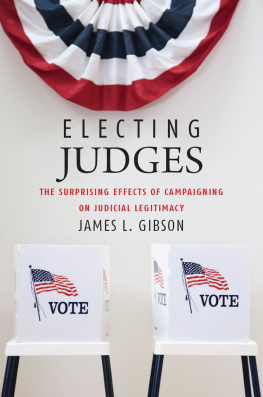
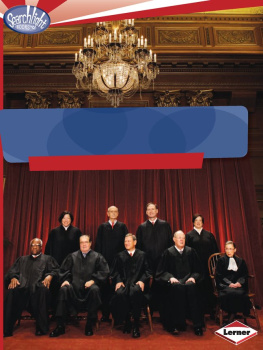
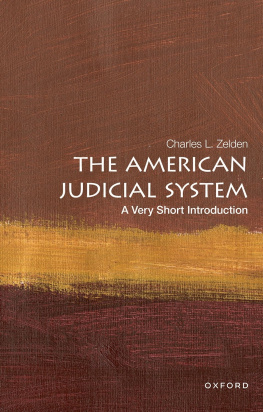
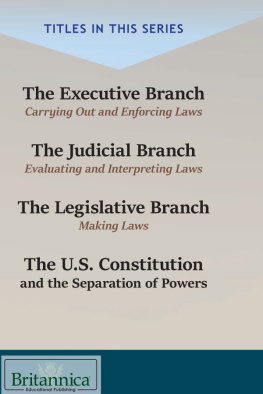
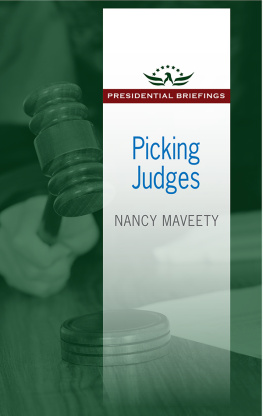
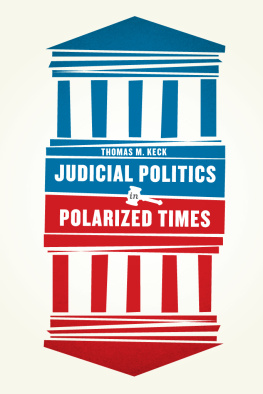
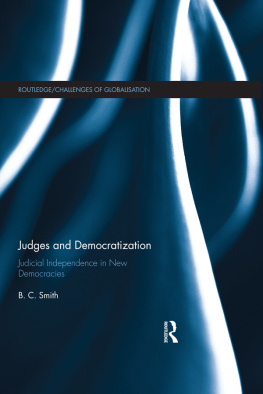
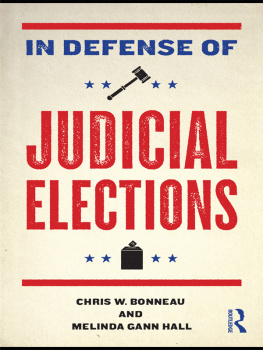
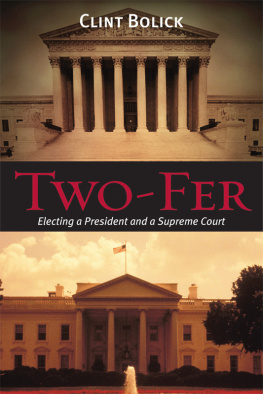
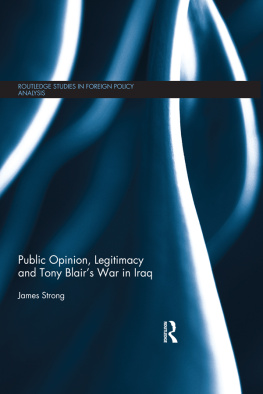
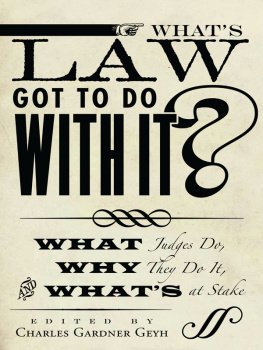
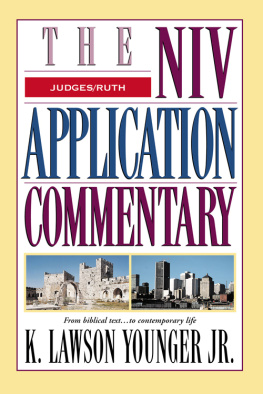
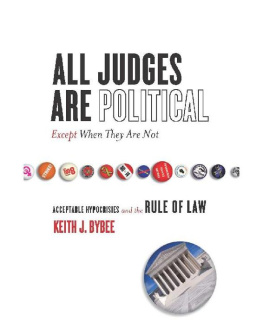
 This paper meets the requirements of ANSI/NISO Z39.48-1992 (Permanence of Paper).
This paper meets the requirements of ANSI/NISO Z39.48-1992 (Permanence of Paper).